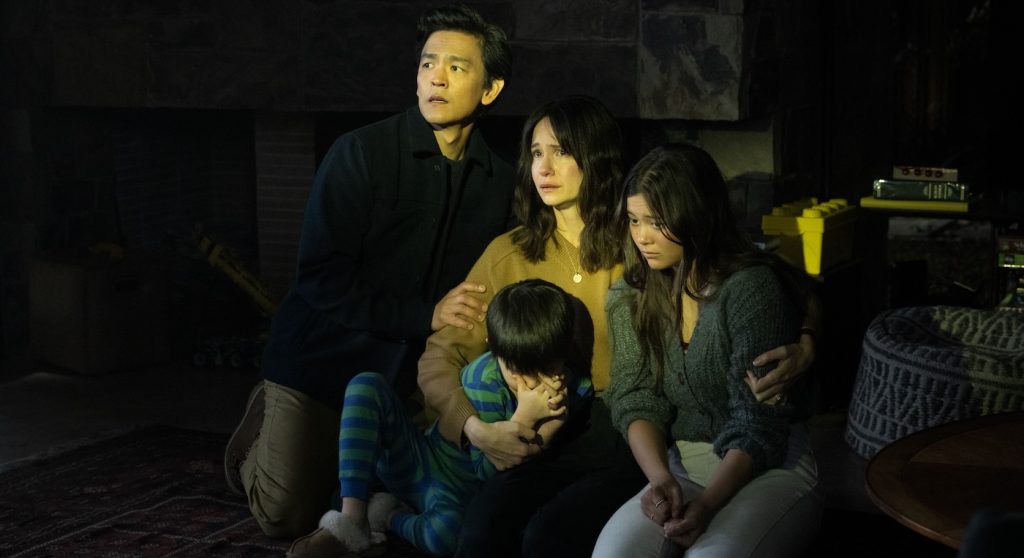How “Afraid” Writer/Director Chris Weitz Cracked the Artificial Intelligence Code in His First Horror Film
What happens when a charming AI device makes itself indispensable to an unsuspecting family of five? In Chris Weitz‘s new horror film Afraid, the smooth-talking “AIA” aims for nothing short of total domination. The film stars John Cho, who caught his first acting break when Weitz and his brother Paul cast him in their directorial debut, American Pie. Katherine Waterston co-stars as Cho’s wife, with Lukita Maxwell, Wyatt Lindner, and Isaac Bae portraying their kids. Production designer David Brisbin developed the slightly anthropomorphic AIA, complete with mood-specific lighting cues, who experiences an Alexa-on-steroids rise to power.
Afraid marks Weitz’s first foray into horror, building on a wide-ranging resume that encompasses everything from American Pie to Rogue One: A Star Wars Story. Speaking from his home in Malibu, Weitz drills into the inspirations for Afraid, including the Pandemic, the nefarious YouTube hoax Momo, and Japanese director Hirokazu Koreeda.
Afraid taps into our growing fascination with Artificial Intelligence over the past few years. How did you come up with the idea for this film?
During the pandemic, I observed the relationship my children were developing with screens and technology, and I thought, ‘This is interesting.’ You can live in a gated community, you can live in what’s supposedly a safe neighborhood, but the Internet is a neighborhood that we all live in all the time, a place where our children go unguarded.
So you had your starting point…
Yeah, and around the same time, there was that amazing New York Times interview with [Microsoft’s] “Sydney” AI by journalist Kevin Roose, which had sinister overtones. Then I read this book called “The Age of Surveillance Capitalism” by Shoshana Zuboff. There was also this weird hoax where parents thought this evil entity called Momo was infiltrating children’s YouTube feeds. So then I thought: What if an unsuspecting little chatbot were thrown out there on the web, including the dark web, with everything terrible that is out there—what kind of opinion would it have of humanity? First of all, it would be driven insane, and second of all, it would have some pretty profound contempt for us as a species. Just this critical mass of stuff collided and made me think: “This is an interesting space for a horror film.”
How did you develop the idea from there?
Over the next year or so, Blumhouse [Productions] waited patiently as I did my research. A lot of things that I made up, or thought I’d made up, have come to pass in terms of the fluency of machine intelligence.
With AIA, her powers don’t seem all that far-fetched.
And by the way AIA is an “it,” not a “she,” but it takes on this [female] persona for the same reason that GPS voices are female, and that’s largely because men can’t take direction from other men. So instead of a cold intelligence like HAL [from 2001 A Space Odyssey] AIA is a warm embracing intelligence that seems to want to be your best friend, your baby sitter, your helper.

She even has a point system!
AIA gamifies good behavior on the part of these children in ways that are like the social credit schemes you hear about in China or loyalty points or rewards. She promises all kinds of benefits if people toe the line.
John Cho plays a dad with three kids. You’re a dad…
With three kids [laughing]. Jon Cho and I are old friends to the extent that I felt comfortable having him playing a version of me, albeit a more charismatic and good-looking version of me. And yeah, the three kids in Afraid represent roughly the age of my kids when I was writing this. If you’d seen my first script, everything that happens in the movie was mapped onto my own house, exactly where each scene took place, because originally, I wanted to shoot the movie at my own house. Calmer heads prevailed, and we eventually found another house to fit the bill. My wife also convinced me to change the names of the children. It’s a very personal story for me.
You shot Afraid in Los Angeles. Were you mindful of the economic impact this would have on the local filmmaking community?
I’m very mindful of it. Every film is kind of a start-up where you create a company and hire people to make the movie. I love Los Angeles crews. This city is the center of the entertainment industry, yet so few features shoot here so it was a big deal to me and something I stuck to. Part of it was wanting to be at home with my family. That’s what the grips and electrical crew want, what every department wants, is not to live this carnivalesque life where you have to leave your family at home.
Did you utilize AI in the technology while making this movie about AI?
Inevitably, yes, but many times, we bent over backward to make with human hands something that looks like it was made by AI. People can tell AI because there’s something creepy about it, like you see in these Heidi trailers. The film opens with something that looks and feels like AI but was created with hand-made CG techniques to give it that feel. It was important that we didn’t cut corners in ways that would adversely affect the number of crew or the work that they were going to do.
To take a step back from Afraid for a minute, you’ve excelled in many different genres over the past two and a half decades. How have you navigated all these different styles?
It’s always been about the next possibility. After American Pie, my brother and I were offered things like Chick Masters [laughing], which I think was never made, but I never wanted to be put in a corner. I made The Golden Compass because it was my favorite book at the time and hugely different from About a Boy.
Then you wrote Rogue One: A Star Wars Story. How did you connect with that franchise?
At age seven, I saw Star Wars in the theater and was hooked from the moment I saw the opening crawl. When I was asked to write a movie that was basically the story of that opening crawl, I felt like I was made to do this.
And now you’ve shot your first horror film.
Horror is one of the few kinds of movies you can convince people to make for a small to medium budget that actually has a reasonable chance at success. But for me, it’s always about people. My favorite Japanese director is Hirokazu Koreeda, who makes very closely observed films like [Cannes Palme d’Or winner] Shoplifters. With Afraid, I thought the horror part of it would be an interesting way to look at family dynamics.
You studied literature at Cambridge University, so writing screenplays seems like a natural extension of your education, but directing is a whole different set of muscles. In directing Afraid, what was your trick for coaxing good performances from child actors?
It’s a different trick each time. Nicholas Hoult was about eleven when we made About a Boy, and now, of course, he’s doing great. Every kid is different. Lukita [Maxwell], who plays Iris, the teen daughter, is a seasoned actor, so I treated her like I would any other actor. For Isaac Bae, seven years old, I go to Koreeda again because the children in his films behave so beautifully. He told me he treats filming like play, so that’s how I approached it here. The first time I met Isaac Bae, we played a game of checkers.
That’s your rehearsal? Checkers?
What you want—and this is true of the set in general—is for people to be excited when they show up for work. I want children to think of the set as a fun place to play. They know eventually they have to get serious about things and be there for the scene, but for me, the most important thing is this sense of play.
Afraid is in theaters now.
For more upcoming films from Sony Pictures, check out these stories:
“The Room Next Door” Trailer Unveils Julianne Moore and Tilda Swinton in Pedro Almodóvar’s Latest
“It Ends With Us” Production Designer Russell Barnes on Crafting Visual Contrasts of Love & Control
New “Kraven the Hunter” Trailer Finds Aaron Taylor-Johnson’s Marvel Villain Off the Leash
Featured image: John Cho in Columbia Pictures and Blumhouse AFRAID



